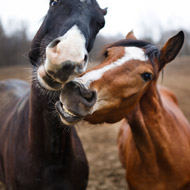
Tests will enable vets to target treatments against small redworm parasites
New funding to develop a blood-based test for the detection of small redworm parasites in horses has been awarded to the Moredun Research Institute.
The funding, awarded by the Horse Trust, will also be used to investigate a saliva-based adaptation of the test, in development at Austin David Biologics.
Currently, direct methods for the detection of all stages of small redworms do not exist. In a press release, Moredun Research Institute said the availability of a diagnostic test will enable vets ‘to make a differential diagnosis, as well as informed treatment decisions’.
In this collaborative project, Professor Jacqui Matthews from the Moredun Research Institute will work with Austin Davis Biologics and Professor Martin Nielsen at the Gluck Equine Research Center, University of Kentucky.
Professor Jacqui Matthews from Moredun commented: “We are delighted to have received this funding; the future availability of these tests will revolutionise the way in which veterinarians approach small redworm control in horses.”
Dr Corrine Austin, of Austin Davis Biologics, added: “We are very pleased to be working on this exciting project. The new tests will enable horse owners to work with their veterinarians in targeting treatments against encysted cyathostomin infections.”
Jeanette Allen, CEO of the Horse Trust said: “Our funding of this important project will move forward the availability of diagnostic tests to detect larval cyathostomins which will be a significant advance to guide treatment decisions.”



 The Federation of Independent Veterinary Practices (FIVP) has announced a third season of its podcast, Practice Matters.
The Federation of Independent Veterinary Practices (FIVP) has announced a third season of its podcast, Practice Matters.